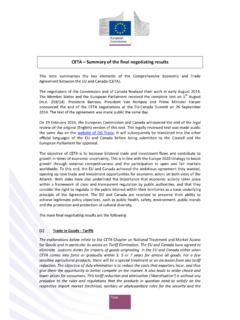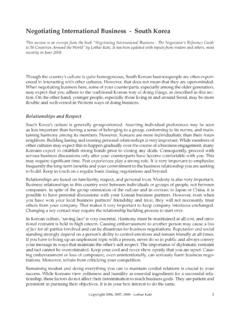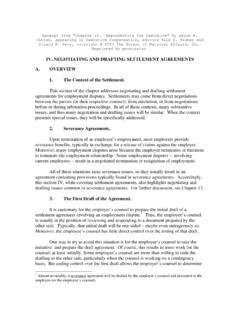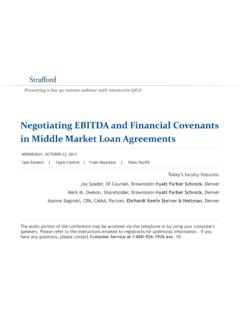Transcription of DRAFTING AND NEGOTIATING SHARE PURCHASE …
1 1 DRAFTING AND NEGOTIATING SHARE PURCHASE AGREEMENTS BY CHIEF ANTHONY IDIGBE, SAN Managing Partner, PUNUKA Attorneys & Solicitors Presented At: NIGERIAN INSTITUTE OF ADVANCED LEGAL STUDIES 5-DAY COURSE FOR GOVERNMENT OFFICIALS 17TH OCTOBER 2011 2 INTRODUCTION A SHARE PURCHASE Agreement is one fundamental document used in business transfers. It is a useful tool in privatization of public enterprises, mergers and acquisitions, joint ventures and other forms of business and company arrangements. The basic commercial and legal issues in DRAFTING and NEGOTIATING commercial contracts apply to SHARE PURCHASE agreements. However, certain terms and provisions are peculiar to the SHARE PURCHASE agreement. There are two types of SHARE PURCHASE : partial PURCHASE and whole PURCHASE . The former involves transfer of only part of the owner s shares such as in privatization1, partnership, and some joint ventures while the latter involves whole transfer of owner s shares as in business transfers, mergers & acquisitions, etc.
2 The provisions of a SHARE PURCHASE agreement for the two types of SHARE PURCHASE would differ slightly. This Paper will discuss the basic principles as well the specific principles for DRAFTING and NEGOTIATING general commercial contracts and SHARE PURCHASE agreements. THE ART OF DRAFTING AN AGREEMENT In DRAFTING a commercial contract, the first basic idea to bear in mind is that the contract may be the subject of legal interpretation sooner or later. The objective is therefore to ensure that the court will interpret the contract in the way the draftsman intended. In other words, the contract must be readily understood by the court and any person reading it. The language must be clear, concise and devoid of ambiguity or multiple interpretations. The courts have developed rules and general techniques for interpretation of contracts and the draftsman should be aware of some of these rules and principles.
3 This is why it is advisable to engage a lawyer or draftsman skilled or knowledgeable in the subject matter of the contract, rather than the practice of general or in-house counsel DRAFTING commercial agreements by mere reliance on precedents or standard templates. Every precedent is This is because every commercial contract involves different facts and circumstances even if it is the same subject matter. A skilled and experienced draftsman is careful to reflect the peculiar circumstances of the contract in whatever precedent is being used and the clauses he includes would depend on the party he is acting for. 1 Note that privatization may also be whole sale. 2 See Simon Beswick, Buying and Selling Private Companies and Businesses, Butterworths, London, Edinburgh and Dublin, 6th Edition 2001 3 In DRAFTING and NEGOTIATING SHARE PURCHASE agreements for instance, the clauses you include depends on who you are acting for, that is whether the buyer or the seller.
4 There are clauses favourable to buyer and others to seller on the same issue and then there is the third option which is a balanced clause fair to both parties. You must always start with the draft favourable to the party you are acting for particularly where there is no standard procurement process in place. You should not negotiate against yourself. Usually the process of due diligence and other procurement processes towards the contract determine the agreed draft. At times the procurement process is rigid and a draft SHARE PURCHASE Agreement is provided as part of the bid process in the RFP (Request for Proposal). Even this can be negotiated. Apart from understanding and employing interpretation principles, the skilled lawyer is better able to identify and manage the various risks and dynamics of the transaction. Thus the role of lawyers in DRAFTING and NEGOTIATING commercial contracts cannot be over emphasized.
5 In DRAFTING a SHARE PURCHASE Agreement and other commercial contracts: Use plain and intelligible English: Avoid legal jargons and archaic English like wherein before , whereto fore etc. Use simple short sentences instead of lengthy paragraphs and phrases as they make the contract difficult to understand and somewhat boring. For instance instead of saying: Upon the date of execution of this Agreement by the parties hereto, the buyer shall make ready and available, and handover the sum of N5 million naira to the seller being the full and final PURCHASE price for the shares subject matter of this contract. In the event that at any time hereinafter the time set forth for the execution of this agreement, the buyer fails, refuses and/or neglects to make the PURCHASE price ready and available to the seller on the date afore mentioned, or the buyer does any act purporting to show that the buyer is unwilling unable and not ready to make the PURCHASE price available to the seller, this agreement and the provisions and obligations herein before mentioned shall cease and terminate forthwith at the instance of the seller say: The buyer shall pay to the seller the PURCHASE price of N5 million on the date of execution of this Agreement failing which the seller will be entitled to terminate this contract.
6 State obligations in the positive instead of in the negative unless absolutely necessary. For instance, instead of saying: The buyer shall not fail to pay the 4 PURCHASE price on the date of delivery of the SHARE certificate , say: The buyer shall pay the PURCHASE price on the date of delivery of the SHARE certificate . Use punctuations correctly. Punctuations, as insignificant as they may seem, play a very important role in the meaning of words and phrases in a contract. For instance the words in the phrase Kill him not, spare him. are exactly the same as Kill him, not spare him. except for the difference in position of the coma. The difference in position of the coma is significant, in fact, so serious as to cost a life rather than save one in the contrasting phrase! State obligations clearly Contracts confer rights and obligations on the parties. A good contract should state each party s rights and obligations clearly the specific obligation, the performer of the obligation, to whom the obligation is owed, when the obligation is to be performed, the consideration for the obligation or corresponding obligation of the other party.
7 Example: Upon payment of the PURCHASE price, the SHARE certificate shall be delivered to the buyer. This example is vague because it is not clear when the payment will be made, who pays the price, who prepares and delivers the certificate to the buyer and when the SHARE certificate will be delivered to the buyer. It is more definite to say: The buyer shall pay the SHARE price of N5 million on the date of execution of this agreement and the seller (or company) shall ensure that the SHARE certificate is delivered to the buyer within 30 days thereafter. Also, depending on the nature of the contract, it may be necessary to specify where the obligation is to be performed ( in a sale of goods transaction: where the goods will be supplied, in a charter party: where the vessel will be delivered and redelivered) and how the obligation is to be performed ( whether payment is to be made by cheque, cash, letter of credit or consideration other than cash).
8 Use Headings for convenience as they make it easy to find particular clauses in the contract and enhance general understanding of the contract. Use Schedules where necessary: Schedules contain details of specific portions of the agreement which cannot neatly be included in the main body of the agreement. They are used to ensure that certain details of an agreement are incorporated in the agreement and binding on the parties. For instance in a SHARE PURCHASE agreement, issues like SHARE valuation, payment schedule, milestones etc. may be included as 5 schedules. It is advisable to insert schedules before the execution and attestation page of the agreement so as to eliminate alteration or substitution of schedule pages after parties have signed. However, this situation can also be avoided by parties initialing all the pages of the contract. Below are some provisions that can be found in Schedules to a SHARE PURCHASE Agreement (depending on the type of SHARE PURCHASE ): - Schedule of Audited Financial Statements - Schedule of Company Assets - Schedule of Material Contracts - Schedule of Permitted Encumbrances - Schedule of Leases, Licenses and permits - Schedule of Employees - Schedule of Pension and Benefit Plans, Incentive Arrangements - Post Transaction Plan (Post Privatization Plan for privatization transactions) - Disclosure Letter BASIC COMMERCIAL & LEGAL ISSUES IN SHARE PURCHASE AGREEMENTS AND GENERAL COMMERCIAL AGREEMENTS Parties Parties are those who have rights or obligations under the contract.
9 A contract should not generally include parties on whom no right or obligation is conferred. This is on the simple principle of privity of contract which presupposes that only parties to a contract can enforce or benefit from it. But sometimes it is necessary to include parties on whom the agreement is intended to be binding. For instance, in a SHARE PURCHASE agreement, the primary parties are the seller (the SHARE owner) and the buyer. In public enterprises, the owner of the shares is usually the government or public authority but in many SHARE PURCHASE agreements of public enterprises, the enterprise or company itself is included as a party in order to bind the company and its other shareholders, although they may not have direct obligations to the buyer. It is noteworthy that the concept that only parties can enforce benefit under a contract is now weaker with the passage of laws such as Contracts (Rights of Third Parties) Act of England by virtue of which a third party beneficiary is entitled to claim under a It follows that in conferring benefits to third parties, it should be borne in mind that in many jurisdictions such third parties can now sue on such contracts.
10 3 See Simon Beswick, Buying and Selling Private Companies and Businesses, Butterworths, London, Edinburgh and Dublin 2001 p. 243. 6 It is also important to state the name of the parties correctly and accurately the exact name by which the company was incorporated or registered so as to avoid the technical (but valid) argument in future that the contracting parties are not legal persons and therefore lacked capacity to contract. In a case we are handling for Federal Airports Authority of Nigeria (FAAN), the Defendant filed a preliminary objection on the ground that the s in Airports was omitted from the Plaintiff s name and therefore the Plaintiff is not a juristic person with locus standi to sue! Where a company is part of a group of companies, it is important to ascertain which member of the group should be party to the contract.








